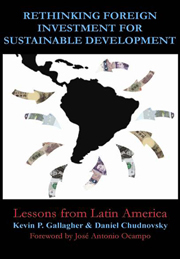Book contents
- Frontmatter
- Contents
- List of Figures
- List of Tables
- Foreword
- Acknowledgements
- Author Biographies
- Rethinking Foreign Investment for Sustainable Development
- 1 FDI and Sustainable Development in the Americas
- 2 Is Foreign Investment Always Good for Development?
- Part 1 Country Assessments
- Part 2 Political Economy of Natural Resources and The Environment
- 7 Investment Rules and Sustainable Development: Preliminary Lessons from the Uruguayan Pulp Mills Case
- 8 Foreigners in the Forests: Saviors or Invaders?
- 9 Bucking the Trend: The Political Economy of Natural Resources in Three Andean Countries
- 10 Beyond Pollution Haloes: The Environmental Effects of FDI in The Pulp and Paper and Petrochemicals Sectors in Brazil
- 11 Missing Links, Dashed Hopes: FDI Spillovers and Sustainable Industrial Development in Mexico's Silicon Valley
- Notes
- References
- Index
8 - Foreigners in the Forests: Saviors or Invaders?
from Part 2 - Political Economy of Natural Resources and The Environment
Published online by Cambridge University Press: 05 March 2012
- Frontmatter
- Contents
- List of Figures
- List of Tables
- Foreword
- Acknowledgements
- Author Biographies
- Rethinking Foreign Investment for Sustainable Development
- 1 FDI and Sustainable Development in the Americas
- 2 Is Foreign Investment Always Good for Development?
- Part 1 Country Assessments
- Part 2 Political Economy of Natural Resources and The Environment
- 7 Investment Rules and Sustainable Development: Preliminary Lessons from the Uruguayan Pulp Mills Case
- 8 Foreigners in the Forests: Saviors or Invaders?
- 9 Bucking the Trend: The Political Economy of Natural Resources in Three Andean Countries
- 10 Beyond Pollution Haloes: The Environmental Effects of FDI in The Pulp and Paper and Petrochemicals Sectors in Brazil
- 11 Missing Links, Dashed Hopes: FDI Spillovers and Sustainable Industrial Development in Mexico's Silicon Valley
- Notes
- References
- Index
Summary
Introduction
This chapter examines the environmental impacts of FDI in the forestry sector in two of the region's major producing countries, Chile and Brazil. One of the characteristics of the world economy over the last two decades has been the strong growth in FDI flows. More and more companies, in an increasing number of economic sectors and countries, now invest beyond the borders of their home countries; meanwhile, the governments of receiving countries are competing more and more to attract foreign investment.
By 2005, about a third of the stock of global FDI has gone to developing countries. Latin America accounts for 10 percent of the global FDI stock. Three countries, Brazil, Argentina and Chile, attracted 82 percent of FDI flows into the region between 1990 and 2002.
The economic benefits of FDI include technological innovation, increases in competitiveness, improvements in efficiency and transfers of intangible resources such as new forms of organization, administration and marketing.
Expectations regarding the environmental impacts of FDI are rather mixed. On the one hand, some argue that FDI brings negative environmental impacts, especially in developing countries that have lower environmental standards and could constitute “pollution havens.” On the other hand, some claim that foreign firms help to improve environmental performance in developing countries by transferring both cleaner technology and management expertise in controlling environmental impacts.
- Type
- Chapter
- Information
- Rethinking Foreign Investment for Sustainable DevelopmentLessons from Latin America, pp. 147 - 178Publisher: Anthem PressPrint publication year: 2009



